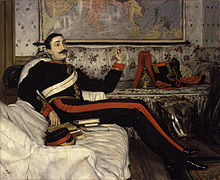Frederick Gustavus Burnaby
| Frederick Gustavus Burnaby | |
|---|---|

Portrait of Burnaby in his uniform as a captain in the Royal Horse Guards by James Tissot (1870)
|
|
| Born | 3 March 1842 Bedford, England |
| Died | 17 January 1885 (aged 42) Abu Klea, Sudan |
| Allegiance |
|
| Service/branch |
|
| Years of service | 1852–1885 |
| Rank | Colonel |
| Battles/wars | Battle of El Teb; Battle of Abu Klea. |
Colonel Frederick Gustavus Burnaby (3 March 1842 – 17 January 1885) was a British Army intelligence officer. Burnaby's adventurous spirit, pioneering achievements, and swashbuckling courage earned an affection in the minds of Victorian imperial idealists. As well as travelling across Europe and Central Asia, he mastered the art of ballooning, spoke a number of foreign languages fluently, stood for parliament twice, published several books, and was admired and feted by the women of London High Society. His popularity was legendary, appearing in a number of stories and tales of empire.
Frederick Burnaby was born in Bedford, the son of the Rev. Gustavus Andrew Burnaby of Somerby Hall, Leicestershire, and canon of Middleham in Yorkshire (d. 15 July 1872), by Harriet, sister of Henry Villebois of Marham House, Norfolk (d. 1883). His sister Mary married John Manners-Sutton. Fred was educated at Bedford School, Harrow, Oswestry School, where he was a contemporary with William Archibald Spooner, and in Germany. Legend has it he could carry two boys under both arms up the stairs of school house. Burnaby was a huge man for his times: 6 ft 4in tall and 20 stone when fully grown. Like so many Household cavalry his outsize personality and strength became the literary legend of imperial might. Lionized by the press for his outlandish expeditious adventures across Central Asia, Burnaby at 6 ft 4 ins tall with broad shoulders and weighing 20 stones, was a giant amongst men, symbolic of a Victorian celebrity, feted in London society.
He entered the Royal Horse Guards in 1859. Finding no chance for active service, his spirit of adventure sought outlets in balloon ascents and in travels through Spain and Russia with his firm friend, George Radford. In the summer of 1874 he accompanied the Carlist forces in Spain as correspondent for The Times, but before the end of the war he was transferred to Africa to report on Gordon's expedition to the Sudan. This took Burnaby as far as Khartoum.
...
Wikipedia
